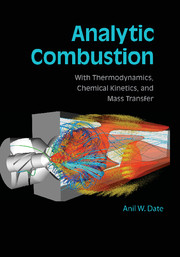Book contents
- Frontmatter
- Contents
- Preface
- Symbols and Acronyms
- 1 Introduction
- 2 Thermodynamics of a Pure Substance
- 3 Thermodynamics of Gaseous Mixtures
- 4 Chemical Equilibrium
- 5 Chemical Kinetics
- 6 Derivation of Transport Equations
- 7 Thermochemical Reactors
- 8 Premixed Flames
- 9 Diffusion Flames
- 10 Combustion of Particles and Droplets
- 11 Combustion Applications
- APPENDIX A Thermochemistry Data
- APPENDIX B Curve-Fit Coefficients for Δhc, Tad, Kp, Cp, h, and s
- APPENDIX C Properties of Fuels
- APPENDIX D Thermophysical and Transport Properties of Gases
- APPENDIX E Atmospheric Data
- APPENDIX F Binary Diffusion Coefficients at 1 atm and T = 300K
- Bibliography
- Index
5 - Chemical Kinetics
- Frontmatter
- Contents
- Preface
- Symbols and Acronyms
- 1 Introduction
- 2 Thermodynamics of a Pure Substance
- 3 Thermodynamics of Gaseous Mixtures
- 4 Chemical Equilibrium
- 5 Chemical Kinetics
- 6 Derivation of Transport Equations
- 7 Thermochemical Reactors
- 8 Premixed Flames
- 9 Diffusion Flames
- 10 Combustion of Particles and Droplets
- 11 Combustion Applications
- APPENDIX A Thermochemistry Data
- APPENDIX B Curve-Fit Coefficients for Δhc, Tad, Kp, Cp, h, and s
- APPENDIX C Properties of Fuels
- APPENDIX D Thermophysical and Transport Properties of Gases
- APPENDIX E Atmospheric Data
- APPENDIX F Binary Diffusion Coefficients at 1 atm and T = 300K
- Bibliography
- Index
Summary
Importance of Chemical Kinetics
In the previous chapter, we analyzed chemical reactions in the manner of thermodynamics – that is, by considering the before and after of a chemical reaction. This analysis did not consider the rate of change of states during the process. Nonetheless, thermodynamic analysis coupled with the chemical equilibrium considerations enabled us to evaluate useful quantities, such as the (a) equilibrium composition of the postulated products, (b) heat of reaction or the calorific value of a fuel, and (c) adiabatic flame temperature.
In this chapter we introduce the empirical science of chemical kinetics, whose precise purpose is to determine the rate of a chemical reaction – in other words, the time rates of depletion of reactants and of formation of products. In this sense, the departure from chemical equilibrium thermodynamics to chemical kinetics may be viewed as analogous to the familiar departure made from thermodynamics to the empirical science of heat transfer. The latter, again, deals with rates of heat transfer across a finite temperature difference.
The science of heat transfer introduces rate quantities such as the heat transfer coefficient α, having units W/m2-K, and the transport property thermal conductivity K, having units W/m-K. Both these quantities are used in design of practical equipment. Thus, with the knowledge of α (which may be obtained from a correlation; see, for example, ref. [47]), we are able to size a heat exchanger by estimating the heat transfer surface area, determine the time required for a cooling process, or ensure that the temperature of solid elements in a furnace or a nuclear reactor is always well below safe limits.
- Type
- Chapter
- Information
- Analytic CombustionWith Thermodynamics, Chemical Kinetics and Mass Transfer, pp. 90 - 111Publisher: Cambridge University PressPrint publication year: 2011



